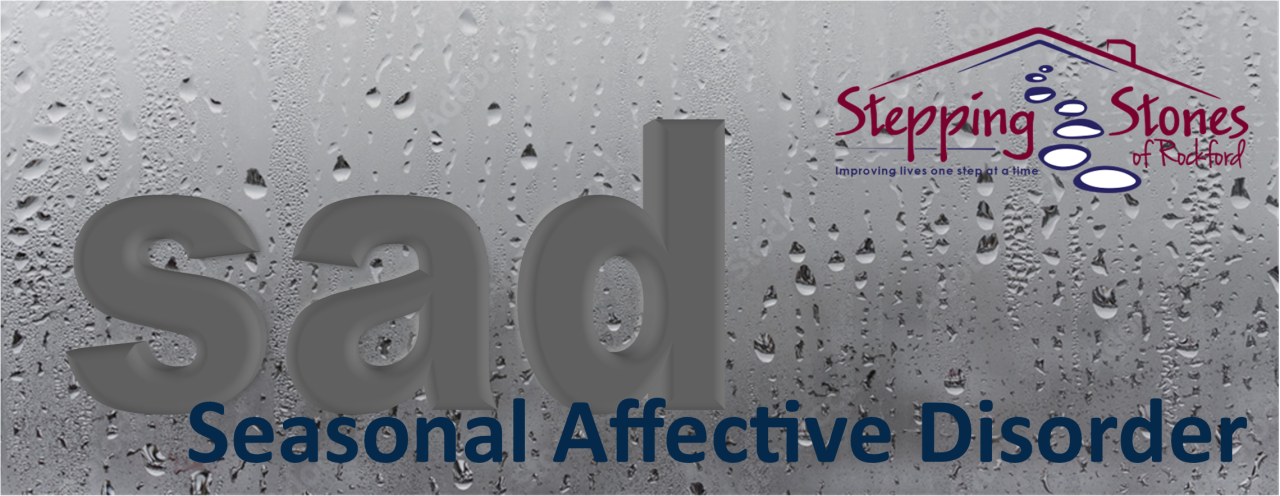News/Blog
Seasonal Affective Disorder
Mid-November in Rockford. Cold. Cloudy. Dark. The leaves have fallen, long gone, leaving trees bare. We go to work and school in the dark; we return in the dark. Do we dare mention the need to scrape windshields from the frost? Why are Christmas Carols already playing 24 hours a day? Oh no, it's snowing ALREADY and AGAIN!
The holidays approach. For some, the holidays are wonderful--a time of family, friendship, celebration.Thanksgiving is full of gratitude, food and festivities. For others, Thanksgiving brings sadness, loneliness and grief. There seems so little for which to give thanks.Thoughts seem as gloomy as a typical Mid-November day in Rockford. It's dark, with hope and happiness feeling very far away. If you have mental illness, it can seem even darker and colder. Symptoms of mental illness may increase in frequency and intensity.
At times, those dreary feelings end up being a little "stronger" than the winter blues or a case of the "blahs..."
The weather, darkness and holidays can play a role in Seasonal Affective Disorder. If you notice you're:
--increasingly moody;
--less energetic, feeling sluggish;
--sleeping more than usual or oversleeping;
--having trouble concentrating;
--having a change in appetite;
--increased anxiety;
--feeling depressed;
--withdrawing socially;
--not interested in favorite activities;
--gaining weight, having headaches, feeling physically less well than usual;
--Feeling hopeless, worthless or guilty...
. ...you might consider if you are experiencing Seasonal Affective Disorder (SAD).
Let's bust those blues! No matter if we love or hate the holidays and winter months, we can all benefit from skill use. It may be difficult to believe, but there is hope during the cold winter month, approaching holidays and symptoms of SAD. Depression, anxiety and grief "tell" us differently. SAD tries to squash our quality of life. Let's find warmth, sunshine, relief and hope, even when none seems to be around.
Skills? Yes, skills--an individual way of addressing those momentary or lasting wintertime "blues. Using coping skills can help lower the intensity of SAD. Skill use is personal. Keep in mind what skills "work" for me may not be the same skills that "work" for you. Here are a few examples of skills to consider when identifying your winter-busting/SAD symptoms/holiday-surviving skills.
Do what works for you.
Light therapy often works for those with SAD. This skill requires you to sit for a few minutes in front of specific type of light box. It would be best to talk to your provider before investing in a light box.
Engage in something you love. If you love to cook, make your favorite meal. If you don't have money to buy ingredients, go to the food pantry and get creative with what they offer. If you love cooking but don't have the energy to cook, fake it 'til you make it--try to make something simple, something of which brings comfort, something you can share. If you love cooking but have no appetite to eat, share your creation with others. Let a little bit of hope rise within, just like the cake you are baking rises in the oven.
If singing helps lift your mood, sing. If you find drawing helps improve your mood, draw. If going for a walk at a local park brings you relief, put on your woolies and take that walk. Sometimes, therapy is the "best" thing that works for those experiencing SAD. Reach out and talk to someone. Local agencies, help lines, churches and support groups provide services can make a difference. It's not a weakness to ask for help.
Practice self care. Take time to Self-soothe.
Take a warm bath--yes, use the bubbles! LIsten to a free relaxation presentation on an app such as Calm or Headspace. (Hint: You don't need to know how to meditate or how to relax. Just follow along with the meditation on the app.) Take a nap. Take a break. Go for a walk.Go for a snow-shoe walk. Do something different--get out of the rut and routine. Do something that distracts you from your symptoms or feelings. Try to catch snowflakes in your mouth! Eat something healthy. Eat something not-so-healthy! Take your medication. Color, knit, read an uplifting book. If you can't read due to symptoms, watch a movie or a favorite TV show. Making your environment brighter (open those curtains and turn on the lights), doing some exercise and getting outside can serve as fabulous self-care skills. Ask yourself, "What healthy outlet or activity makes me feel better? What skills can I use to distract myself?" Let self-care give you a moment of peace and a bit of relief from the cold, dark days.
Challenge Your Thoughts.
Depression tries to convince us that there is no hope or help to be found. Grief, trauma and depression want us to think we are alone. SAD makes it hard to get motivated. Sometimes just knowing we're not alone helps. Challenging our thoughts is one way to acknowledge our feelings while reminding us that there isn't a perfect holiday. Ask yourself what is and isn't true. You probably don't feel like socializing when SAD symptoms surface. Getting out and being around people can be a great benefit, no matter what your thoughts suggest. Set realistic goals--challenge yourself to identify if the goal you've set is realistic!
Ask for help. Seek help.
Yes, you deserve to be happy, hopeful and safe. You are not alone, no matter what those gloomy clouds or sad thoughts suggest. The holidays are not happy for everyone. Reach out, even when reaching out seems impossible. Call 988 if you are feeling suicidal or hopeless. Contact your provider, your clergy, your support group, your safe person. There are agencies, churches, groups waiting to help you. You are more than worth it.
Radical acceptance.
This can be a difficult skill to use, but is often helpful at times of stress, frustration, sadness. Radical acceptance tells us to remember that the situation is what it is. It's not good or bad. It is what it is. It's easy to radically accept it's cold out, it's cloudy out, it's dark out. After all, all you have to do is look out the window or step outside. There's nothing you can do about it besides put on a warm coat and turn on the lights. It's a little harder to radically accept that grief is "normal" as part of the healing process. Loss is difficult at the holidays, on anniversaries, in daily life. It is what it is. Don't let anyone tell you otherwise. You can't "do" grief wrong. Radically accept your grief. It is what it is... and, that's okay. Trauma can suck the hope right out of the day. It is what it is. SAD is a "real" thing. You didn't make this up! It is what it is and that's okay.
Stay Sober.
Using substances is not the most skillful way to address SAD. Enough said!
Follow Doctor's Orders.
If you see a medical provider to address SAD, please follow doctor's orders. If prescribed an antidepressant, take them as prescribed. If a lack of Vitamin D is potentially part of the issue, the provider might suggest taking a supplement. Ask about a light box.
For those without SAD--
Please support those with SAD.
Help others find purpose.
Share your joy.
Be willing to listen.
Use a non-judgmental stance.
Encourage use of skills.
Advocate, educate, bust stigma about mental health.
Have empathy....
After all, SAD is real. It's not a weakness. It's more than the blues.
Honor those with SAD...
Be a champion for those with Seasonal Affective Disorder!

